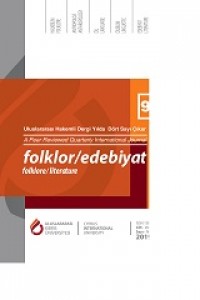Configuration of Transient Shelters as Alternative Spaces through Nomadic Acts in Doris Lessing’s “An Old Woman and Her Cat”
Öz
Doris Lessing’s short story “An Old Woman and Her Cat” from her collection, The
Temptation of Jack Orkney, revolves around the nomadic experiences of an old and
homeless woman in various places and her survival under poor living circumstances
with her cat. The places occupied by the old woman in this story such as the
Council flats, the room in the slum and the ruined flat in a wealthy neighbourhood
cannot be considered as proper homes where people have a sense of belonging;
rather, they are just material places she tries to appropriate as shelters temporarily
on the way without a feeling of warmth and attachment to them. Focusing on the
woman and the cat’s relationship with their surrounding provides a discussion on
space and nomadism within the framework of Henri Lefebvre’s spatial tripartite
- the perceived, the conceived and the lived - which is related to Rosi Braidotti’s
theory on nomadism. It also reveals the social norms and values, which disregard
an old woman and her cat’s struggle for life in a metropolis. Therefore, this article aims to discuss not only the material qualities of transient places in London and
their conceived perspective which segregates the poor and the homeless from the
wealthy but also the old woman’s configuration of alternative spaces for herself out
of the ruins without a sense of home.
Anahtar Kelimeler
Kaynakça
- Braidotti, R. (1997). Comment on Felski’s ‘The doxa of difference’: Working through sexual difference. Signs, 23(1), 23-40.
- Braidotti, R. (2002). Metamorphoses: Towards a materialist theory of becoming. Cambridge: Polity Press.
- Braidotti, R. (2006). Transpositions. Malden, MA: Polity.
- Braidotti, R. (2011). Nomadic subjects: Embodiment and sexual difference in contemporary feminist theory. New York: Columbia University.
- Braidotti, R. (2011). Nomadic theory: The Pprtable Rosi Braidotti. New York, NY: Columbia University. Compact Oxford English dictionary. (1971). Vols. I & II. Oxford: Oxford University Press.
- De Certeau, M. (1984). The practice of everyday life. Berkeley: University of California.
- Deleuze, G. & F. Guattari. (1987). A thousand plateaus: Capitalism and schizophrenia. Trans. Brian Massumi. Minneapolis: University of Minnesota.
- Foucault, M. (1980). Questions on geography. Power/Knowledge: Selected Interviews and Other Writings, 1972-1977. (Ed.), C. Gordon. Brighton: Harvester Press, 63-77.
- Lefebvre, H. (1991). The Production of space. Trans. D. .... Nicholson-Smith.) Cambridge: B. Blackwell.
- Lefebvre, H. (1996). Writing on cities. (Trans. E. Kofman & E. Lebas.) Oxford: Blackwell. Google Book Search. Web. 21 Feb. 2018.
- Lefebvre, H. (2003). The urban revolution. (Trans. R. Bononno.) Minneapolis: University of Minnesota. Google Book Search. Web. 2 April 2018.
- Lessing, D. (1979). The temptation of Jack Orkney: Collected Stories. Vol 2. London: Triad Grafton.
- Merrifield, A. (1993). Place and space: A Lefebvrian Reconciliation. Transactions of the Institute of British Geographers, 18 (4), 516-531.
- Schmid, C. (2008). Henri Lefebvre’s Theory of the production of space: Towards a Three-dimensional dialectic. Space, Difference, Everyday Life. (Eds.), K. Goonewardena, S. Kipfer, R. Milgrom & C. Schmid. London: Routledge, 27-45.
- Schmid, C. (2012). Henri Lefebvre, The right to the city, and the New Metropolitan Mainstream. Cities for people, not for Profit: Critical Urban Theory and the Right to the City. (Eds.), N. Brenner, P. Marcuse & M. Mayer. London: Routledge, 42-62.
- Soja, E. (1996). Thirdspace: Journeys to Los Angeles and ather real-and-imagined places. Oxford: Blackwell.
- Somerville, P. (1992). Homelessness and the meaning of home: Rooflessness or rootlessness? International Journal of Urban and Regional Research, 16 (4), 529-539.
- Wright, T. (1997). Out of place: Homeless mobilizations, subcities, and contested landscapes. Albany: State University of New York.
- http://www.vocabulary.com (last accessed 11 April 2018)
Ayrıntılar
| Birincil Dil | İngilizce |
|---|---|
| Konular | Sanat ve Edebiyat |
| Bölüm | Derleme Makaleleri -Compilation Articles |
| Yazarlar | |
| Yayımlanma Tarihi | 1 Ağustos 2019 |
| Yayımlandığı Sayı | Yıl 2019 Cilt: 25 Sayı: 99 |
Derginin yayım dili Türkçe ve İngilizce’dir, ayrıca Türkçe de olsa tüm basılan makalelerin başlık, öz ve anahtar sözcükleri İngilizce olarak da makalede bulunur. Hakemlerden onay almış Türkçe makaleler için 750-1000 sözcükten oluşan genişletilmiş özet (extended summary) gereklidir. Elektronik çeviriler kabul edilmez.
Dergi TR-Dizin, Web of Science (ESCI), DOAJ ile diğer pek çok dizin tarafından taranmaktadır. Scimagoe quartile değeri: Q2 'dir:
TR DIZIN 2020 Etik Kriterleri kapsamında, dergimize 2020 yılından itibaren etik kurul izni gerektiren çalışmalar için makalenin yöntem bölümünde ilgili Etik Kurul Onayı ile ilgili bilgilere (kurul-tarih-sayı) yer verilmesi gerekecektir. Bu nedenle dergimize makale gönderecek olan yazarlarımızın ilgili kriteri göz önünde bulundurarak makalelerini düzenlemeleri önemle rica olunur.
Alan Editörleri/ Field Editörs
Halkbilimi/Folklore
Prof.Dr. Hande Birkalan-Gedik (JohannWolfgang-Goethe İniversitet-birkalan-gedik@m.uni-frankfurt.de)
Prof.Dr. Ali Yakıcı (Gazi Üniversitesi-yakici@gazi.edu.tr)
Prof.Dr. Aynur Koçak (Yıldız Teknik Üniversitesi-nurkocak@yildiz.edu.tr)
Prof.Dr. Işıl Altun (Regensburg Üniversitesi/Kocaeli Üniversitesi-İsil.Altun@zsk.uni-regensburg.de)
Doç.Dr. Ahmet Keskin (Samsun Üniversitesi-ahmet.keskin@samsun.edu.tr)
Edebiyat/Literature
Prof.Dr. Abdullah Uçman (Mimar Sinan Güzel Sanatlar Üniversitesi -emekli-29 MayısÜniversitesi-abdullahucman@29mayis.edu.tr
Prof. Dr. Ramazan Korkmaz (Ardahan Üniversitesi-emekli-Kafkasya Üniversiteler Birliği -KÜNİB-r_korkmaz@hotmail.com)
Prof.Dr. Emel Kefeli (Marmara Üniversitesi-emekli-İstanbul 29 Mayıs Üniversitesi-ayseemelkefeli @gmail.com)
Prof.Dr. Zekiye Antakyalıoğlu ( İstanbul Aydın Üniversitesi-zekabe@hotmail.com)
Antropoloji/Anthropology
Prof.Dr. Hanife Aliefendioğlu (Doğu Akdeniz Üniversitesi-hanife.aliefendioglu@emu.edu.tr)
Prof. Dr. Şebnem Pala Güzel (Başkent Üniversitesi-sebnempa@baskent.edu.tr)
Prof.Dr. Derya Atamtürk Duyar (İstanbul Üniversitesi-datamturk@istanbul.edu.tr)
Prof.Dr. Meryem Bulut (Ankara Üniversitesi-meryem.bulut@gmail.com)
Dil-Dilbilim/Language-Linguistics
Prof.Dr. Nurettin Demir (Hacettepe Üniversitesi-demir@hacettepe.edu.tr)
Prof. Dr. Aysu Erden (Maltepe Üniversitesi-aysuerden777@gmail.com)
Prof.Dr. Sema Aslan Demir (Hacettepe Üniversitesi-semaaslan@hacettepe.edu.tr)


